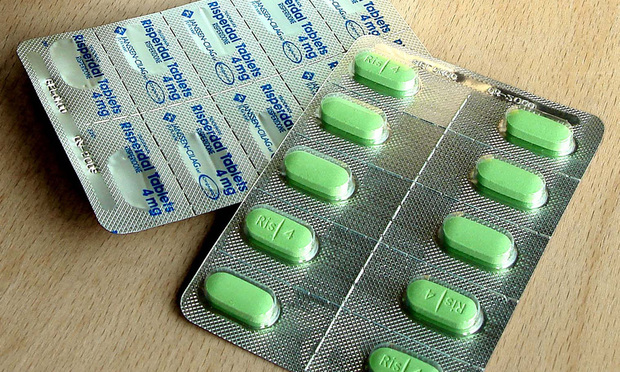Jury Sent Message With $8B Risperdal Verdict, but Lawyers Don't Expect It to Stand
Attorneys who focus on products liability in Pennsylvania said Tuesday's verdict is "impressive" and "staggering," but added that 25-year-old U.S. Supreme Court case law all but ensures the award will be reduced on appeal.
October 09, 2019 at 04:57 PM
7 minute read
 Risperdal. Photo: Wikimedia Commons
Risperdal. Photo: Wikimedia Commons
The $8 billion award handed to a man who developed excessive breast tissue after using the antipsychotic drug Risperdal is likely the largest verdict in Pennsylvania history, according to a review of The Legal's archives. But, court watchers agree, it is unlikely to remain that size for long.
On Tuesday, a Philadelphia jury ruled 10-2 to slam Johnson & Johnson and its subsidiary Janssen Pharmaceuticals with the multibillion-dollar verdict. The award was solely for punitive damages after the case, Murray v. Janssen, initially came to a $1.75 million verdict by a separate jury, which was later reduced to $680,000.
A review of The Legal's archives show the $8 billion award is the largest verdict since at least 1994, when The Legal began tracking each year's largest verdict and settlement. The only higher award was part of a settlement hammered out in 2000, when Pennsylvania received $11.3 billion as its share of the nationwide $206 billion settlement to end tobacco litigation.
Attorneys who focus on products liability in Pennsylvania said Tuesday's verdict is "impressive" and "staggering," but added that 25-year-old U.S. Supreme Court case law all but ensures the award will be reduced on appeal.
"There's not a hard-and-fast ratio to punitives, but the Supreme Court made clear it should have a rational relationship," defense attorney James Heller of Cozen O'Connor said. "Most courts look to three to four times."
By that measure, the verdict would be reduced to the single-digit millions, but Heller said it is unlikely the trial court would reduce it by that much.
"I think the Philadelphia court will reduce it into the low eight figures, and then the Superior Court will keep that, or reduce it even further," he said.
Richard Jurewicz of Galfand Berger, who represents plaintiffs in products liability cases, said the "staggering" verdict was "a great victory for the plaintiffs bar" and trial counsel—Thomas Kline of Kline & Specter and Jason Itkin of Arnold & Itkin in Houston. But he also agreed it is likely to be reduced.
"I do sense that, as much as the plaintiffs have a right to benefit from the wisdom of the jury and their collective judgment … I think the trial court may be inclined to try and remit the amount of the punitive damages," he said.
Jurewicz likened the litigation to a RoundUp case that ended with a $2 billion punitive damages award, that was later reduced to $86 million. The California judge overseeing that case, which was against Monsanto, determined that the ratio between the $55 million compensatory award and the $2 billion punitive damages verdict was excessive.
Related story: Judge Who Reduced $2B Roundup Verdict Said Monsanto Manipulated the Science
The judge cited the 1996 Supreme Court case BMW of North America v. Gore, which said that when courts are trying to determine if a punitive damages award is "grossly excessive" courts should look to the degree to which a defendant's conduct is reprehensible, the comparison to other punitive damages awards and the ratio with the compensatory damages.
Kennerly Loutey attorney Max Kennerly, who also represents plaintiffs, agreed the verdict will be substantially reduced. However, he said courts are not supposed to mathematically tie punitive damages awards to the compensatory awards, so the punitive verdict is likely to remain high.
"The United States Supreme Court has specifically rejected any sort of precise mathematical ratio that needs to be followed, and Pennsylvania courts also don't have bright-line limitations on punitive damages," he said in an email. "Given the conduct at issue here, involving years of wrongful conduct, the end result itself will likely still be quite large."
'Long Way From Being Over'
Johnson & Johnson has already announced it plans to appeal the ruling, saying the damages award is "grossly disproportionate" with the compensatory award. In the statement released shortly after the verdict, the company also hinted it will challenge the trial judge's ruling to preclude much of the mitigating evidence.
"The company was precluded from presenting a meaningful defense due to the court's exclusion of key evidence," Johnson & Johnson spokesman Andrew Wheatley said. "As a result, the jury did not hear evidence as to how the label for Risperdal clearly and appropriately outlined the risks associated with the medicine, or the benefits Risperdal provides to patients with serious mental illness."
The limited scope of the trial was clear during the closing arguments, when numerous objections were sustained against defense counsel Ethel Johnson of Morgan, Lewis & Bockius, as she tried to mention things the judge said went to arguments about causation, which was not at issue in the punitive damages phase.
The reason for the limitation was because the trial court initially determined that the plaintiffs in the Risperdal litigation would not be able to seek punitive damages. However, the state Superior Court reversed that ruling last year, saying that, depending on the law of each plaintiffs' home state, some cases could raise punitive damages claims. Since Murray came to a verdict on compensatory damages in 2015, the recent punitive damages phase was bifurcated, meaning the jury was unaware of any of the defense's causation arguments about why they made the decisions they made and whether those decisions were negligent.
Without those arguments, the jury starts the case simply knowing that the company acted improperly, which makes this wave of Risperdal cases unique.
"Where there's liability and damages in one trial, where those issues are intertwined, proving liability may have a draw factor against punitive damages," Jurewicz said. "The defendant is able to explain what steps it took, and why it did what it did in terms of the development of the drug. When it comes to the trial in punitives, none of that is relevant."
According to Heller, that is likely another area the Superior Court is likely to examine, and may ultimately determine that the judge was too narrow with his rulings.
"If that's the case, it's likely it will get thrown back to the trial court, and another jury," Heller said. "I think this is a long way from being over."
Currently nearly 7,000 Risperdal cases are sitting on the docket in Philadelphia, and according to Kline, there have been no talks so far about settling the litigation globally. While attorneys disagreed on exactly how significant a chip the latest verdict will be at the bargaining table, Kennerly said it should serve as a warning about the downside of a strong reluctance to settle.
"Frankly, it should serve as a reminder to J&J that their war-of-attrition approach to this round of Risperdal cases was a mistake, because the end result of all that litigation was, as we just saw, to establish as a matter of fact and a matter of law that J&J is liable to the plaintiffs and that sizable punitive damages are warranted in each of the pending cases," Kennerly said. "A wise defendant would usually do better to settle before that."
This content has been archived. It is available through our partners, LexisNexis® and Bloomberg Law.
To view this content, please continue to their sites.
Not a Lexis Subscriber?
Subscribe Now
Not a Bloomberg Law Subscriber?
Subscribe Now
NOT FOR REPRINT
© 2025 ALM Global, LLC, All Rights Reserved. Request academic re-use from www.copyright.com. All other uses, submit a request to [email protected]. For more information visit Asset & Logo Licensing.
You Might Like
View All
Ozempic Defendants Seek to Shave 'Tacked On' Claims From MDL Complaint
3 minute read
Plaintiff Argues Jury's $22M Punitive Damages Finding Undermines J&J's Talc Trial Win
4 minute read
'Discordant Dots': Why Phila. Zantac Judge Rejected Bid for His Recusal
3 minute read
Pittsburgh Jury Tries to Award $22M Against J&J in Talc Case Despite Handing Up Defense Verdict
4 minute readTrending Stories
- 1De-Mystifying the Ethics of the Attorney Transition Process, Part 2
- 2Being a Profession is Not Malarkey
- 3Bring NJ's 'Pretrial Opportunity Program' into the Open
- 4High-Speed Crash With Police Vehicle Nets $1.6 Million Settlement
- 5Embracing a ‘Stronger Together’ Mentality: Collaboration Best Practices for Attorneys
Who Got The Work
J. Brugh Lower of Gibbons has entered an appearance for industrial equipment supplier Devco Corporation in a pending trademark infringement lawsuit. The suit, accusing the defendant of selling knock-off Graco products, was filed Dec. 18 in New Jersey District Court by Rivkin Radler on behalf of Graco Inc. and Graco Minnesota. The case, assigned to U.S. District Judge Zahid N. Quraishi, is 3:24-cv-11294, Graco Inc. et al v. Devco Corporation.
Who Got The Work
Rebecca Maller-Stein and Kent A. Yalowitz of Arnold & Porter Kaye Scholer have entered their appearances for Hanaco Venture Capital and its executives, Lior Prosor and David Frankel, in a pending securities lawsuit. The action, filed on Dec. 24 in New York Southern District Court by Zell, Aron & Co. on behalf of Goldeneye Advisors, accuses the defendants of negligently and fraudulently managing the plaintiff's $1 million investment. The case, assigned to U.S. District Judge Vernon S. Broderick, is 1:24-cv-09918, Goldeneye Advisors, LLC v. Hanaco Venture Capital, Ltd. et al.
Who Got The Work
Attorneys from A&O Shearman has stepped in as defense counsel for Toronto-Dominion Bank and other defendants in a pending securities class action. The suit, filed Dec. 11 in New York Southern District Court by Bleichmar Fonti & Auld, accuses the defendants of concealing the bank's 'pervasive' deficiencies in regards to its compliance with the Bank Secrecy Act and the quality of its anti-money laundering controls. The case, assigned to U.S. District Judge Arun Subramanian, is 1:24-cv-09445, Gonzalez v. The Toronto-Dominion Bank et al.
Who Got The Work
Crown Castle International, a Pennsylvania company providing shared communications infrastructure, has turned to Luke D. Wolf of Gordon Rees Scully Mansukhani to fend off a pending breach-of-contract lawsuit. The court action, filed Nov. 25 in Michigan Eastern District Court by Hooper Hathaway PC on behalf of The Town Residences LLC, accuses Crown Castle of failing to transfer approximately $30,000 in utility payments from T-Mobile in breach of a roof-top lease and assignment agreement. The case, assigned to U.S. District Judge Susan K. Declercq, is 2:24-cv-13131, The Town Residences LLC v. T-Mobile US, Inc. et al.
Who Got The Work
Wilfred P. Coronato and Daniel M. Schwartz of McCarter & English have stepped in as defense counsel to Electrolux Home Products Inc. in a pending product liability lawsuit. The court action, filed Nov. 26 in New York Eastern District Court by Poulos Lopiccolo PC and Nagel Rice LLP on behalf of David Stern, alleges that the defendant's refrigerators’ drawers and shelving repeatedly break and fall apart within months after purchase. The case, assigned to U.S. District Judge Joan M. Azrack, is 2:24-cv-08204, Stern v. Electrolux Home Products, Inc.
Featured Firms
Law Offices of Gary Martin Hays & Associates, P.C.
(470) 294-1674
Law Offices of Mark E. Salomone
(857) 444-6468
Smith & Hassler
(713) 739-1250





